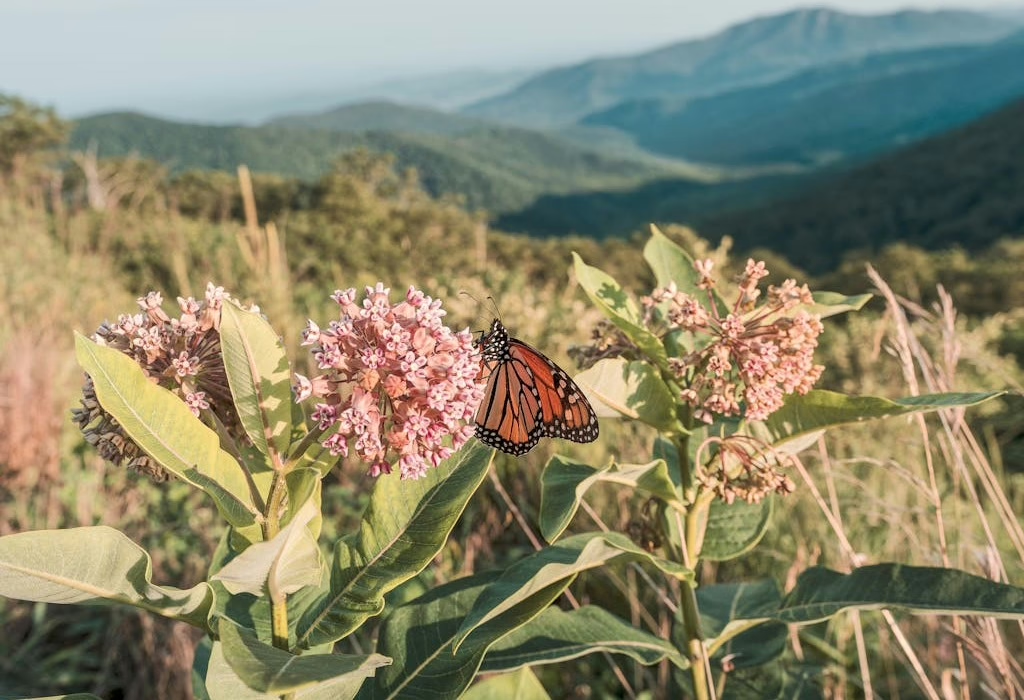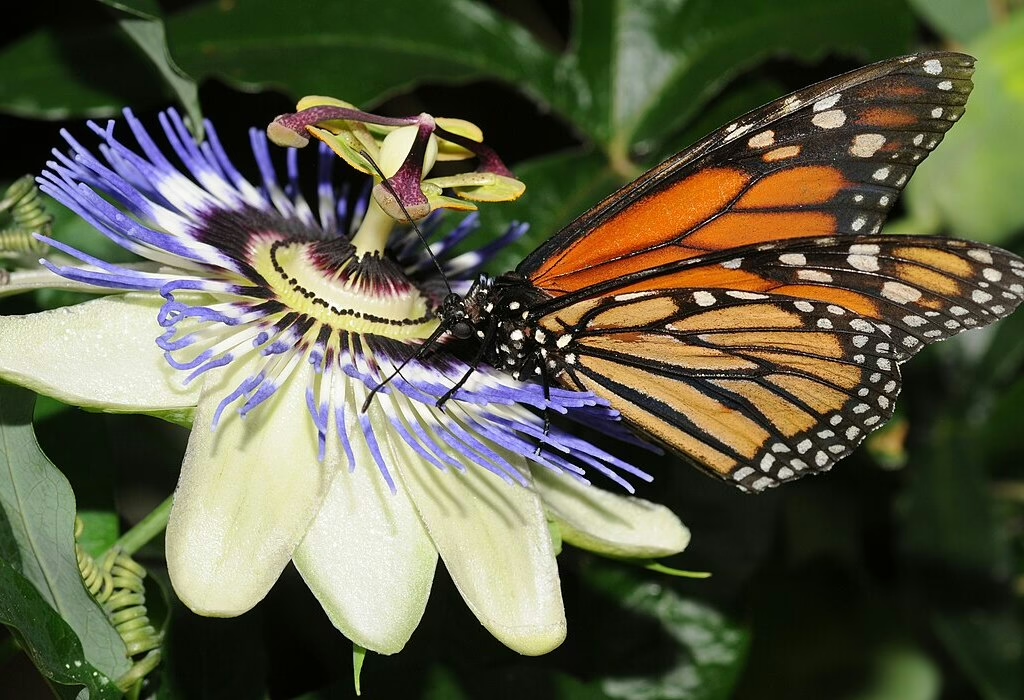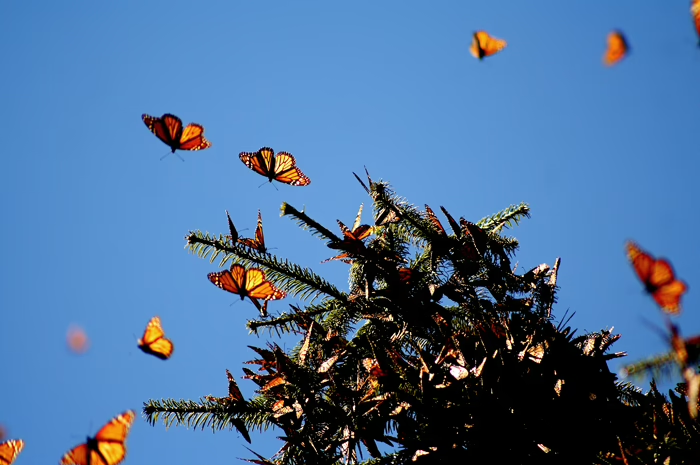Table of contents:
- Introduction 🦋
- When is the monarch butterfly season? 🦋
- Sierra Chincua 🦋
- Santuario Ejido El Capulín 🦋
- El Rosario 🦋
- Santuario Piedra Herrada 🦋
- Santuario La Mesa 🦋
- More about Monarch Butterflies 🦋
- Conclusion 🦋
- Informative Video 🦋
Introduction
The Monarch Butterfly Sanctuary in Mexico is a beautiful sight that attracts many visitors each year. The butterflies travel from Canada to Mexico between November and March. They find safe places to rest in several sanctuaries before heading back to the United States in spring. The Monarch Butterfly Biosphere Reserve, a UNESCO World Heritage Site since 2008, covers more than 16,100 hectares across two Mexican states and is home to these butterflies.
If you’d like to observe this spectacle, there are numerous sanctuaries to go to. There is something very special about each one, beautiful forests and great vantage points to see the butterflies rest on the trees. Whether you are walking about Sierra Chincua, traversing Santuario Piedra Herrada or reveling in the tranquility of El Rosario, there’s a sanctuary for you. In some places, you can even hire a guide, rent a horse and sleep in comfortable cabins.

Visiting the Monarch Butterfly sanctuaries is not just about seeing the butterflies but also learning about their long journey and the important role they play in nature. The monarchs are at risk due to climate change, and the sanctuaries help protect them. Besides the butterflies, visitors can enjoy nature, relax outdoors, and admire Mexico’s beautiful landscapes.
This article gives helpful details about the top Monarch Butterfly sanctuaries, including their opening hours, entry fees, and directions. It also gives advice on what to bring, like comfortable clothes, a backpack, and money. Whether you are a regular traveler or visiting for the first time, seeing the Monarch butterfly migration in Mexico will be an unforgettable experience.
When is the monarch butterfly season?
Every winter, between November and March, millions of monarch butterflies dress the forests of central-western Mexico in orange, whitish, and black tones. After traveling thousands of kilometers from Canadian lands, this little flier arrives at the Mexican states’ forests.
For over 40 years, these beautiful creatures have been coming here to reproduce and find their new home. The most famous sanctuary, Piedra Herrada, was constructed to protect this unique biological phenomenon. This place is part of the Monarch Butterfly Biosphere Reserve, which was declared a Natural World Heritage Site by UNESCO in 2008. Currently, the reserve covers an area of over 16,100 hectares shared by 10 municipalities in two Mexican states.
🦋 Admire monarch butterflies closely with our tours:
- Monarch Butterfly Tour Mexico (Private Guide & Driver / Private / 12h)
- Mexico Monarch Butterfly (Sanctuary & Christmas / Private / 14h)

Below are the top 5 sanctuaries that you can visit.
Note: The reservation schedules and dates from the sanctuary may vary due to Mexican celebrations, the COVID-19 pandemic, or external factors on the part of the personnel working on the reserves. Likewise, we recommend that you always bring the following to make your visit to any of the following sanctuaries more comfortable:
- Comfortable travel backpack
- Comfortable clothing
- Jacket
- Money
1. Sierra Chincua
It is located very close to Angangueo. Here, you will find experienced guides who will provide you with information about the animals and plants of the place.
Monarch butterflies stand out for living around 9 months, much more than others. To arrive at this sanctuary, you need to hike around 2.5 km. But don’t worry; you will be fully rewarded as you will see numerous breathtaking views along the way. The facilities include a restaurant, a parking lot, and a particular camping area.
How to get there?
Departing from Mexico City is approximately a 3-hour drive. You should travel by bus (departure times to this destination are at the Obsertvatorio bus terminal) to Zitacuaro. Once you arrive in Zitacuaro, ask a taxi to take you to Angangueo, this mini-magical town with butterflies on the poles that will guide you to the Sierra Chincua Sanctuary.
Sierra Chincua Opening Hours:
| Monday | 8:00–17:00 |
| Tuesday | 8:00–17:00 |
| Wednesday | 8:00–17:00 |
| Thursday | 8:00–17:00 |
| Friday | 8:00–17:00 |
| Saturday | 8:00–17:00 |
| Sunday | 8:00–17:00 |
Sierra Chincua Entrance Cost:
On average, access costs 35 pesos (1.94 USD) with a guide, and to go up on a horse round trip, the price ranges between 80 pesos (4.43 USD) and 100 pesos (5.54 USD).
2. Santuario Ejido El Capulín
You can reach this sanctuary on Cerro Pelón Mountain on the 4-km hike. The area is a total of beautiful landscapes with impressive forests that attract millions of monarch butterflies to hibernate here yearly. Here, you will find horse rentals, tables for family meals, and typical snack stores. Affordable cabins are available, and it is perfect for being close to nature. El Capulín is located in Donato Guerra, 80 km west of Toluca.
How to get there?
Departing from Mexico City, this place is approximately 2 hours and 30 minutes away. As in Sierra Chincua, the best way to get to Zitacuaro is to leave the Poniente bus terminal (Observatorio). For a visit to the sanctuary, it is best to rent a taxi from Zitacuaro, and in 30 minutes, you will be at the sanctuary enjoying the monarch butterflies.
Ejido el Capulín Opening Hours:
| Monday | 9:00–17:00 |
| Tuesday | 9:00–17:00 |
| Wednesday | 9:00–17:00 |
| Thursday | 9:00–17:00 |
| Friday | 9:00–17:00 |
| Saturday | 9:00–17:00 |
| Sunday | 9:00–17:00 |
Ejido el Capulín Entrance Cost:
Fees vary, but general admission is $80 per person. These rates may increase if you want to guide or rent a horse. Beware of scammers, and go with a guide you trust.
3. El Rosario
El Rosario is one of the most beautiful sanctuaries of the Monarch butterfly. This reserve will take you through the interior of a dense mixed forest of pine and fir. The hills are home to millions of Monarch butterflies in their thick trunks and leafy branches, making these trees their home each year. To reach this site, you must ascend the mountain for approximately 2 kilometers. You can do it either on foot or on horseback.
We also recommend hiring a local guide. In addition to getting to the exact place where butterflies live, you will learn about their characteristics and other curious information. This is the largest reserve in Mexico, so you will not regret it.
How to get there?
The distance between Mexico City and El Rosario Sanctuary is 3 hours. To get to Sierra Chincua, you have to follow the steps we mentioned. The only difference is that when you get to Angangueo, ask a cab to take you to this shrine, which is a little further ahead of Sierra Chincua.
El Rosario Opening Hours:
| Monday | 8:00–17:00 |
| Tuesday | 8:00–17:00 |
| Wednesday | 8:00–17:00 |
| Thursday | 8:00–17:00 |
| Friday | 8:00–17:00 |
| Saturday | 8:00–17:00 |
| Sunday | 8:00–17:00 |
El Rosario Entrance Cost:
The entrance fee to this sanctuary is $80 pesos (4.43 USD) for Adults – $50 pesos (2.77 USD) for children.
4. Santuario Piedra Herrada
To get to the sanctuary, one has to walk for 40 minutes up the slope of the Nevado de Toluca volcano. The landscape there consists of imposing mountains of more than 3,000 meters in altitude. Butterflies are attracted by omels, a local species of pine trees. These trees are essential in providing them with the necessary conditions to grow and reproduce.
How to get there?
It is the closest sanctuary to Mexico City since it is only 1 hour and 59 minutes away and can be reached from Mexico City or Valle de Bravo. If you travel by car, take the Toluca highway to Temascaltepec, then turn off towards Valle de Bravo, and you will find the road to Piedra Herrada.
Piedra Herrada Opening Hours:
| Monday | 9:00–16:00 |
| Tuesday | 9:00–16:00 |
| Wednesday | 9:00–16:00 |
| Thursday | 9:00–16:00 |
| Friday | 9:00–16:00 |
| Saturday | 9:00–16:00 |
| Sunday | 9:00–16:00 |
Piedra Herrada Entrance Cost:
Admission to the sanctuary is 100 pesos (5.53 USD) for adults and 70 pesos (3.87 USD) for children; if you want to rent a horse, it costs 300 pesos (16.59 USD).

5. Santuario La Mesa
Located at the foot of the mountains that separate Michoacan and the Estado de Mexico (State of Mexico), this sanctuary is home to thousands of monarch butterflies in winter. There is a tourist hostel with cabins, restaurants, viewpoints, and trails ideal for biking. Furthermore, you can rent horses and hire local guides where butterflies stay.
How to get there?
This sanctuary is also one of the closest to Mexico City. If you travel by bus from Mexico City, it is best to leave from the Poniente Bus Terminal (Observatorio). Take the bus to Villa Victoria and San Jose del Rincon. At Guadalupe stop (parada de Guadalupe) board a local taxi that will take you to the sanctuary.
La Mesa Opening Hours:
| Monday | 9:00–17:00 |
| Tuesday | 9:00–17:00 |
| Wednesday | 9:00–17:00 |
| Thursday | 9:00–17:00 |
| Friday | 9:00–17:00 |
| Saturday | 9:00–17:00 |
| Sunday | 9:00–17:00 |
La Mesa Entrance Cost:
This sanctuary, which has an entrance fee of $50 pesos (2.77 USD), is perfect for nature lovers and has a deer hatchery inside, which is perfect for kids.
More about Monarch Butterflies
One of the main reasons for this annual trip is that monarchs are highly vulnerable to climate change. Temperature sets the tone for their reproduction, and a drastic change can break their life cycles. On the way to the oyamel forests, three generations of monarchs are born and die. Once born in Mexico, they undertake their return to the United States once winter is over.

Alongside this information, some people are not sure if Michoacan or its surroundings are an excellent option to travel to due to the insecurity of Mexico. Nevertheless, in this country, there are many contrasts and not only negativity. For example, I will cite the article by Partyingtraveler:
“Seeing millions of monarchs fluttering about is something that I hope everyone can experience in their lifetime. Of all the things I’ve seen in my travels, witnessing the monarch butterfly migration in Mexico has nothing else I could compare it to”.
Another important note to take into account is the next one: for butterflies to enjoy their stay in Mexico, you should not touch or disturb them but rather appreciate them in silence and with respect. If you are going to travel as a family, it is an excellent opportunity to teach the little ones to respect all species of nature.
Conclusion
In conclusion, a visit to a butterfly sanctuary in Mexico is a chance to experience one of the most amazing natural events in the world. The monarch butterflies, after traveling long distances, find a safe home in the forests of Mexico. These sanctuaries offer visitors the chance to see the butterflies closely and learn about their life cycle and migration.
The butterfly sanctuary in Mexico is not just about observing the butterflies; it’s also an opportunity to connect with nature. Visitors can enjoy peaceful walks in the forest, see beautiful landscapes, and take in the fresh air. For those who want a more adventurous experience, some sanctuaries offer guided tours, horseback riding, and places to stay near the sanctuary.

Moreover, visiting these sanctuaries gives people a better understanding of the importance of protecting the environment. The monarch butterflies are vulnerable to changes in the climate, and sanctuaries play an important role in helping to protect them. By supporting these sanctuaries, visitors help preserve this beautiful migration for future generations.
Butterfly sanctuaries in Mexico are spread across the country which means that lots of people have easy access to them. First time or not, you’ll have an unforgettable time on this trip to Mexico. It’s a peaceful setting, and a chance to see something beautiful in nature while learning more about the monarch butterflies.
Put simply, a butterfly sanctuary in Mexico is a rare experience that we as nature lovers, families and travelers who care for the planet need to experience. It’s an opportunity to learn, discover and enjoy the beauty of one of the world’s most remarkable natural migrations. A trip to a butterfly sanctuary in Mexico is a dream come true come experience.
